

The lucid dreaming playbook: how to take charge of your dreams. In Tibetan Buddhism, the group of tantric techniques known as milam aim to reveal the illusory nature of waking life by having practitioners perform yoga in their dreams.

It’s a ritualised version of one of the most mysterious faculties of the human mind: to know that we’re dreaming even while asleep, a state known as lucid dreaming. Lucidity (awareness of the dream) is different to control (having power over the parameters of the experience, which can include summoning up objects and people, attaining superpowers and travelling to fantastic worlds). But the two are closely linked, and many ancient spiritual traditions teach that dreams can yield to us with time and practice. How? As a researcher in psychology, I’ve approached this question scientifically.
Subscribe to Aeon’s Newsletter Yet distilling reliable methods for inducing lucid dreams has proved to be a struggle. 1. Warnings From Sleep: Nightmares and Protecting The Self. “All of this is evidence that the mind, although asleep, is constantly concerned about the safety and integrity of the self.”
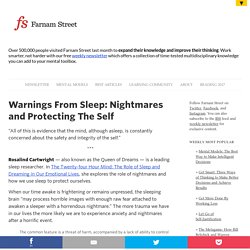
Rosalind Cartwright — also known as the Queen of Dreams — is a leading sleep researcher. In The Twenty-four Hour Mind: The Role of Sleep and Dreaming in Our Emotional Lives, she explores the role of nightmares and how we use sleep to protect ourselves. When our time awake is frightening or remains unpressed, the sleeping brain “may process horrible images with enough raw fear attached to awaken a sleeper with a horrendous nightmare.” The Science of Sleep: Regulating Emotions and the Twenty-four Hour Mind. “Memory is never a precise duplicate of the original; instead, it is a continuing act of creation.”
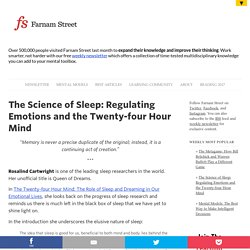
Rosalind Cartwright is one of the leading sleep researchers in the world. Her unofficial title is Queen of Dreams. In The Twenty-four Hour Mind: The Role of Sleep and Dreaming in Our Emotional Lives, she looks back on the progress of sleep research and reminds us there is much left in the black box of sleep that we have yet to shine light on. Melatonin. Why Six Hours Of Sleep Is As Bad As None At All. Not getting enough sleep is detrimental to both your health and productivity.

Yawn. Why broken sleep is a golden time for creativity — A... It is 4.18am.

In the fireplace, where logs burned, there are now orange lumps that will soon be ash. Orion the Hunter is above the hill. Taurus, a sparkling V, is directly overhead, pointing to the Seven Sisters. Sirius, one of Orion’s heel dogs, is pumping red-blue-violet, like a galactic disco ball. As the night moves on, the old dog will set into the hill. It is 4.18am and I am awake. If I write in these small hours, black thoughts become clear and colourful. SleepTiming: Sleep Calculator. Dawn simulator curbs wintertime blues. Hypnagogia and Hypnopompia. Hypnagogia is the imagery, sounds and strange bodily feelings that are felt at “sleep onset.”

This is a simplification though, as researchers have noted hypnagogic imagery in the lab at periods of quiet wakefulness as well as stage 1 sleep. Others have correlated hypnagogia with pre-sleep alpha waves and also REM intrusion into sleep onset. The Science of Lucid Dreaming. Brain Zaps Can Trigger Lucid Dreams. Lucid dreams, in which people are aware of and can control their dreams, are rare.
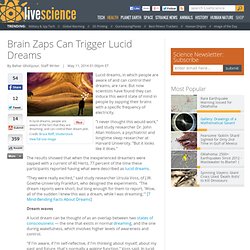
But now scientists have found they can induce this weird state of mind in people by zapping their brains with a specific frequency of electricity. "I never thought this would work," said study researcher Dr. John Allan Hobson, a psychiatrist and longtime sleep researcher at Harvard University. Lucid Dreaming Frequently Asked Questions Answered by The Lucidity Institute.
Version 2.4 © Lucidity Institute (contact us) This FAQ is a brief introduction to lucid dreaming: what it is, how to do it, and what can be done with it.
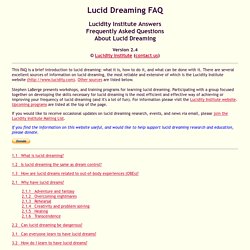
There are several excellent sources of information on lucid dreaming, the most reliable and extensive of which is the Lucidity Institute website ( Other sources are listed below. Stephen LaBerge presents workshops, and training programs for learning lucid dreaming. Participating with a group focused together on developing the skills necessary for lucid dreaming is the most efficient and effective way of achieving or improving your frequency of lucid dreaming (and it's a lot of fun). For information please visit the Lucidity Institute website. Why you should learn to lucid dream. If you’ve never experienced it then you may find it hard to understand what lucid dreaming is all about.
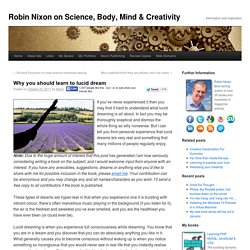
In fact you may be thoroughly sceptical and dismiss the whole thing as silly nonsense. But I can tell you from personal experience that lucid dreams are very real and something that many millions of people regularly enjoy. Note: Due to the huge amount of interest that this post has generated I am now seriously considering writing a book on the subject, and I would welcome input from anyone with an interest. If you have any anecdotes, suggestions, dreams or anything else you’d like to share with me for possible inclusion in the book, please email me. Dreamcatcher ( Life is a dream. ) Working with Dreams: Techniques of CG Jung & James Hillman. Working with Dreams: Depth Psychology Techniques of Carl Gustav Jung and James Hillman Dream work is ancient, it’s long tradition evidenced in the temples of Asclepius in Greece where individuals went to be healed through their dreams.
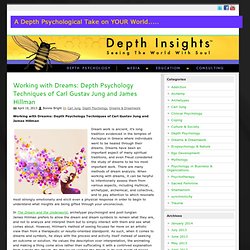
Dreams have been an important aspect of many spiritual traditions, and even Freud considered the study of dreams to be his most important work. There are many methods of dream analysis. When working with dreams, it can be helpful to intentionally assess them from various aspects, including mythical, archetypal, alchemical, and collective, and to pay attention to which resonate most strongly emotionally and elicit even a physical response in order to begin to understand what insights are being gifted through your unconscious.
Alternative Sleep Cycles: You Don’t Really Need 6-8 Hours! Most people only think that there is one way to sleep: Go to sleep at night for 6-8 hours, wake up in the morning, stay awake for 16-18 hours and then repeat. Actually, that is called a monophasic sleep cycle, which is only 1 of 5 major sleep cycles that have been used successfully throughout history. Want to get ahead? Sleep in. Smug early birds take note: Night owls actually have more mental stamina than those who awaken at the crack of dawn, according to new research. "It's the late risers who have the advantage, and can outperform the early birds," said Philippe Peigneux, a professor of clinical neuropsychology at the Free University of Brussels in Belgium, who along with co-author Christina Schmidt published the counterintuitive findings in the latest issue of the journal Science .
Using magnetic resonance imaging, the pair conducted an experiment that measured alertness and ability to concentrate in 30 subjects who were naturally "extreme" early or late risers. How to Spend the Last 10 Minutes of Your Day. How much sleep did you get last night? If the answer is “not enough” you’re hardly alone. According to Gallup’s estimates, almost half the people you’ll run into today are suffering from some level of sleep deprivation. We often dismiss a little morning fatigue as an inconvenience, but here’s the reality. Missing sleep worsens your mood, weakens your memory, and harms your decision-making all day long. Brains Sweep Themselves Clean Of Toxins During Sleep. Katherine Streeter for NPR While the brain sleeps, it clears out harmful toxins, a process that may reduce the risk of Alzheimer's, researchers say. During sleep, the flow of cerebrospinal fluid in the brain increases dramatically, washing away harmful waste proteins that build up between brain cells during waking hours, a study of mice found.
Night Owls Smarter: A New Study Suggests That Late-To-Bed-Late-To-Rise Leads To Greater Workplace Success : Healthy Living. A new study suggests the early riser has only more time for mediocrity. Researchers at the University of Madrid followed nearly 1,000 teenagers and found that night owls bested "morning larks" in qualities linked to general intelligence, such as inductive reasoning, conceptual and analytical thinking. "What hath night to do with sleep? " asked John Milton, the 17th century English poet who worked as a civil servant, among a class of people generally obliged to rise early in the morning.
Indeed, while many early risers outperform night owls in school, researchers said the late risers surpass their counterparts later in the workforce. Differences in preset circadian rhythms might explain the 8 percent advantage enjoyed by early risers in school, researchers said. A previous study conducted by the U.S. Jim Horne, a professor of psychophysiology at Loughborough University, commented on the Spanish study.